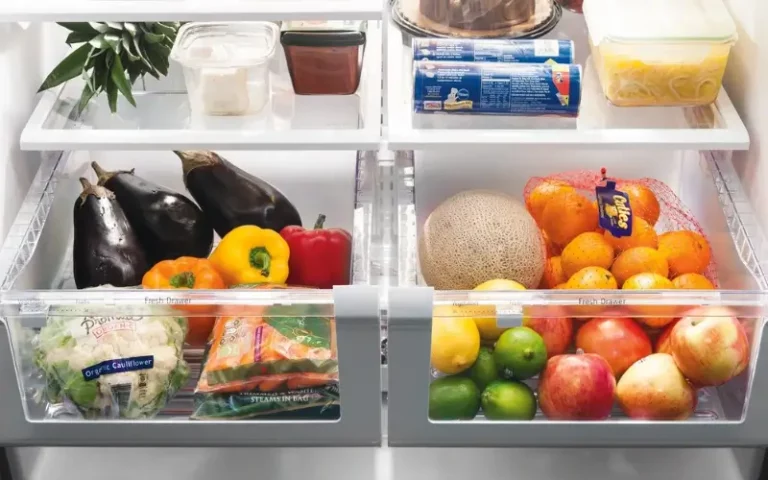Eggplant is not commonly consumed in many households, despite the fact that it can be transformed into a delectable dish with various recipes. People tend to underutilize this versatile vegetable, and sometimes end up purchasing more than they can consume, resulting in leftover eggplants that may raise concerns about their freshness.
If you find yourself in this situation with eggplants that have been sitting in your kitchen for an extended period of time, you may wonder if they have gone bad and how you can tell. In this article, we will address these questions, but first, let’s take a look at the proper way to store eggplants.
How To Shop For Eggplants?
The key to proper eggplant storage begins with careful selection when shopping for this fruit, yes, fruit, not vegetable.
It is recommended to choose just ripe eggplants that are firm to the touch. Inspect the skin visually, making sure it is unblemished and evenly colored, without any wrinkles or punctures. Additionally, check the stems, which should be green and healthy, not dry.
It’s worth noting that older or damaged fruits and vegetables tend to spoil faster, so it’s important to choose fresh and intact eggplants.

While larger eggplants may seem like a good deal, they often have a slightly bitter taste compared to smaller ones. This is because they contain more seeds, which are a source of bitterness in eggplants. It’s also important to know that eggplants that are past their prime may also taste bitter.
Now, let’s talk about the best storage methods for eggplants.
How To Store Eggplants?
To ensure optimal storage of your eggplants, it’s important to follow some key steps. First, remove any plastic wrap around the eggplants, as they last longer when they have proper ventilation.
When deciding where to store your fresh eggplants, you have two options: the pantry or the fridge. The ideal temperature for storing eggplants is around 50-54°F, which may not be achievable in most pantries unless you live in a cold climate. If your pantry is reasonably cool, you can store eggplants there for a few days.
If you live in a hot climate, it’s best to store eggplants in the fridge, preferably in the crisper drawer, which can extend their shelf life by a few more days. However, be cautious about storing eggplants near fruits that produce ethylene gas, as exposure to this gas can accelerate the ripening process of eggplants.
Keep in mind that refrigeration is not always recommended, as it can cause the flesh of eggplants to darken and potentially over-ripen if stored with other fruits that produce ethylene gas. It’s also not advisable to cut raw eggplants before refrigeration, as the flesh can quickly turn brown. If you have cooked eggplant, store it in an airtight container before refrigeration to prevent absorption of other odors in the fridge.

Another option for storing eggplants is freezing. For best results, blanch and flash freeze the eggplant pieces, then dry them and pack them in vacuum-sealed bags before placing them in the freezer. Freezing can also work well for cooked eggplant dishes, making it easier to defrost a fully cooked meal when needed.
In terms of shelf life, the exact duration can vary depending on factors such as storage temperature and freshness at the time of purchase. Generally, fresh eggplants can last for a few days in a cool pantry, up to a week in the fridge, and several months in the freezer when properly stored. So how long do eggplants last?
How Long Does Eggplant Last?
As mentioned earlier, the shelf life of eggplants can vary depending on storage conditions. In the pantry, where the temperature is closer to optimal, eggplants can last for about 3-5 days. In the fridge, where ripening is slowed, they can last for approximately 7-10 days, and if you have cut them, they may last for about 3-4 days.
It’s important to note that even if you apply lemon water, it won’t prevent the exposed flesh of eggplants from browning, which can lead to a loss of texture and flavor. Therefore, it’s best to avoid pre-cutting eggplants into pieces if possible.
When it comes to cooked eggplants, they should be kept in the fridge for no longer than 3-5 days. For blanched and fully cooked eggplant dishes stored in the freezer, they can last for several months without issues, but it’s recommended to consume them within a year for best quality.
To determine if your eggplant has gone bad, look for signs such as a slimy texture, mold growth, off odors, or a brown coloration that appears throughout the flesh. If you notice any of these signs, it’s best to discard the eggplant, as it may no longer be safe to consume. Always use your best judgment and rely on your senses to determine if your eggplant is still fresh or if it has spoiled.
So how can you tell when your eggplant has gone bad?
How To Tell When Eggplant Has Gone Bad?
Spoilage in eggplants can often be identified by the appearance of the skin. If the skin becomes withered and wrinkly, it is likely too old and should not be consumed. Old eggplants can also taste bitter as they move past their peak and become unpalatable.
Softness in an eggplant may indicate rotting, and it’s important to be vigilant for such signs. Some people may choose to cut away a small, squishy part if the rest of the eggplant appears firm, but this should be done at your own risk.

If you cut into an eggplant and find that the flesh has already turned brown, it could be a sign of spoilage. It’s important to note that the browning should have already set in, and not have started after you cut the eggplant. While eggplant flesh may naturally turn brown after cutting, it should still be safe to eat, although it may affect the texture and taste somewhat.
Additionally, if you notice the stem of the eggplant starting to turn brown or showing signs of mold, it’s best to discard the entire eggplant to avoid consuming spoiled portions. Always prioritize food safety and use your best judgment when determining if an eggplant is still fresh or if it has spoiled.
Benefits Of Eggplant
Eggplants are a nutrient-rich fruit, packed with vitamins and minerals that contribute to overall health. They are particularly high in vitamins C and K, as well as minerals such as magnesium, manganese, potassium, phosphorus, and copper.

The high fiber content of eggplants promotes good gut health and can help resolve digestive issues. Additionally, vitamins C, potassium, and magnesium in eggplants are beneficial for heart health, while the fiber content aids in lowering cholesterol levels, which can impact blood circulation.
Eggplants are also rich in antioxidants, which combat free radical damage to cells and reduce the risk of various cancers and chronic illnesses. Furthermore, the phytonutrients present in eggplants can enhance brain function by improving blood circulation and stimulating neural pathways.
Incorporating eggplants into your diet can provide a wide range of health benefits due to their impressive nutrient profile and potential positive effects on heart health, gut health, and brain function.
Conclusion
It’s important to be aware that fruits and vegetables can deteriorate quickly, especially if they have traveled long distances from farms. It’s difficult to know how well they were handled during transportation.
To minimize the risk of spoilage, it’s best to shop for the freshest-looking options and consume them promptly. Shopping more frequently in smaller quantities can help reduce the risk of wastage and ensure that you’re consuming the freshest produce.
Alternatively, if you want to extend the shelf life of your fruits and vegetables, you can make use of your freezer. Freezing can be a reliable way to preserve your stock for many months, allowing you to enjoy your produce at a later time without worrying about spoilage. Properly freezing fruits and vegetables can help retain their freshness and nutritional value for longer periods of time.



